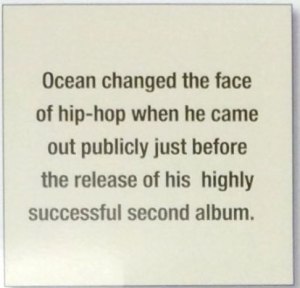I originally posted this piece through the Odyssey on September 28th, 2015.
A poster hanging in my college’s student union reads, “[I]n 2012 critically acclaimed songwriter Frank Ocean changed the face of hip-hop when he came out two days prior to the release of his second album, ‘Channel Orange.’ ” This is a loaded opening statement. Frank Ocean, in an act of bravery and strength, “changed the face of hip-hop.”
At first I was ecstatic. I was excited to see an amazing artist, one who has collaborated with hip-hop artists from many sub-genres, coming out. Yet as I thought harder, I felt uneasy. In coming out, Ocean certainly took a step forward both personally, as well as for the LGBTQ community as a whole. For someone so well known and respected to come out is both powerful and progressive. Yet it is a great leap to say that Ocean “changed the face of hip-hop.”
To say that Ocean changed the face of hip-hop is to whitewash the fact that hip-hop is still a community that has yet to come to terms with its homophobia. The 90s and early 2000s saw a litany of gay-bashing, with artists such as Big L and DMX making a sport of it. While overt homophobia does not appear as often in this current age of hip-hop, it is unfortunately still alive. In saying that Ocean changed anything outright is to mistake a step for a leap. In order to have progress, it is important not to overstate your gains. Celebration is appropriate and necessary, but magnifying progress made to such a level as this poster suggests shrouds a movement in a false sense of victory. The LGBTQ community has not won over hip-hop, yet. It is important not to imply so.
Homophobia manifests itself in hip-hop in a much more implicit manner than in years past. While the trend of using the words “fag” and “gay” in songs has nearly fallen off, hypermasculinity in hip-hop culture has continued to fill that void. In an interview conducted by the Guardian the year after Ocean’s coming out (and during Snoop’s questionable transition into Snoop Lion), Snoop Dogg stated, “Frank Ocean ain’t no rapper. He’s a singer. [Homosexuality is] acceptable in the singing world, but in the rap world I don’t know if it will ever be acceptable because rap is so masculine.”
Here we have two issues that illustrate the problems I have with the poster in discussion: first, we have a prominent and influential rapper admitting to the hip-hop community’s uncomfortable relationship with homosexuality. While Snoop does ensure us that he has nothing against homosexuality himself, his words echo the sentiment of many involved in the genre. For many hip-hop and rap artists, hypermasculinity in lyrics is necessary, and this creates an environment that is tacitly homophobic. The term “pussy n****” permeates many songs, namely in the somewhat-recent and incredibly popular sub-genre of trap music. Searching the term on Rap Genius generates 16,669 results; the first seven of which have the term in their respective titles. While the term is not necessarily used to mean “gay,” this pejorative is a keen example of hypermasculinity in rap culture. It is tantamount to calling another rapper or the subject of the rap a girly-boy (to put it in third-grade terms). As Snoop himself said, it is this hyper masculine environment that breeds an aversion to homosexuality, as it builds a wall of rhetoric contrary to stereotypes surrounding homosexuals.
Second, while the poster places Ocean in the realm of hip-hop, it is clear from Snoop Dogg’s comments that not everyone considers him member of that community. The Equality Forum (the group responsible for the poster), by placing Ocean in the category of hip-hop artist, assumes that their definition of hip-hop matches that of everyone involved in the genre (from artists to fans to labels and beyond). This is part and parcel of the misstatement that Ocean changed the face of hip-hop. Definitions of hip-hop, and the placement of artists into that definition, can be different depending on the environment. Many hip-hop artists could have easily heard about Ocean’s coming out and said to themselves, “What a progressive move for R&B.” If hip-hop’s artists cannot relate to Ocean as another hip-hop artist, the possibilities that his coming out actively changed artists’ minds are much slimmer.
Reading the Equality Forum’s poster, hip-hop fans and artists may assume that certain actions and words are appropriate simply because there is an artist among them that is homosexual. We cannot let this be the case. The poster assumes a culture of acceptance where one does not exist. Let’s not mistake steps for leaps, and let’s continue to strive for safe space for LGBTQ artists in one of the most popular genres in the past twenty years.
As an aside, Ocean’s career has not had “unstoppable momentum” as suggested by Alexis Petridis. We’re still waiting on that album promised in July, Frank.
(Note: This is a topic that I wish to explore further, and this piece itself may continue to develop in the future. It will most likely address the complicated aspect of Tyler, the Creator as a collaborator and friend of Frank Ocean.)

